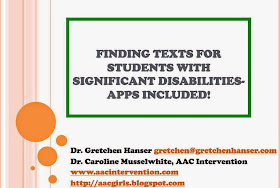Summer movies . . . are you ready? Well, if you’re not, your kids probably are!!
I did a fun activity today – one of those ideas you get late
at night that actually WORKS!!
Materials: Here’s what you need:
• Photos representing trailers for 2 movies you think your
student(s) would like
• Voting board + PostIts
• Letter writing prompt (below)
I picked Minions & Inside Out. Here are screenshots that we used.
 Vote by Letter:
Vote by Letter:
We asked the students to vote by writing for the trailer
that they wanted to watch first.
LOTS of excitement!
Students who typically aren’t excited about trying to figure out the
sound/letter system were fired up!
Here are a few examples. Most students used light tech alphabet displays to help them
figure out the letters. A few
students were able to write their votes on the PostIts. Each student then voted for their
favorite movie trailer (Minion won).
-
One student chose M to represent Minion
-
One student wrote NSID to vote for Inside Out
-
One student chose MN to represent minion

As each student cast their vote (we wrote it on the PostIt
for most students), we tried to figure it out, sounding it out.
Then we had each student place their
PostIt under the correct photo.
We then watched both trailers (the winning one was viewed
first!)
Letters to Parents:
1)
I modeled on the SmartBoard, using talk alouds
(ex: “Hmmmm, who do I want to go
with me . . . I know, Robert!) and asking students to help me figure out some
of the sounds.
2)
Then each student worked with a teacher,
therapist, or aide to fill in the blanks on their letters home. Students used their light or high tech
communication systems to help with ideas as needed. For example, Jess went to the ‘Describing’ page to pick COOL
to tell what expected about the movie.
3)
Students could then find pictures or draw on
their letters before putting them in backpacks to take home.
Changing This for
Home Use:
If you want to do this activity at home, here are some
ideas:
• Have siblings or friends participate in the voting part
• If you’re helping your child write the letter, have them
write it to someone else (Dad, Grandma, older sibling, favorite aunt)
Enjoy!!
















































